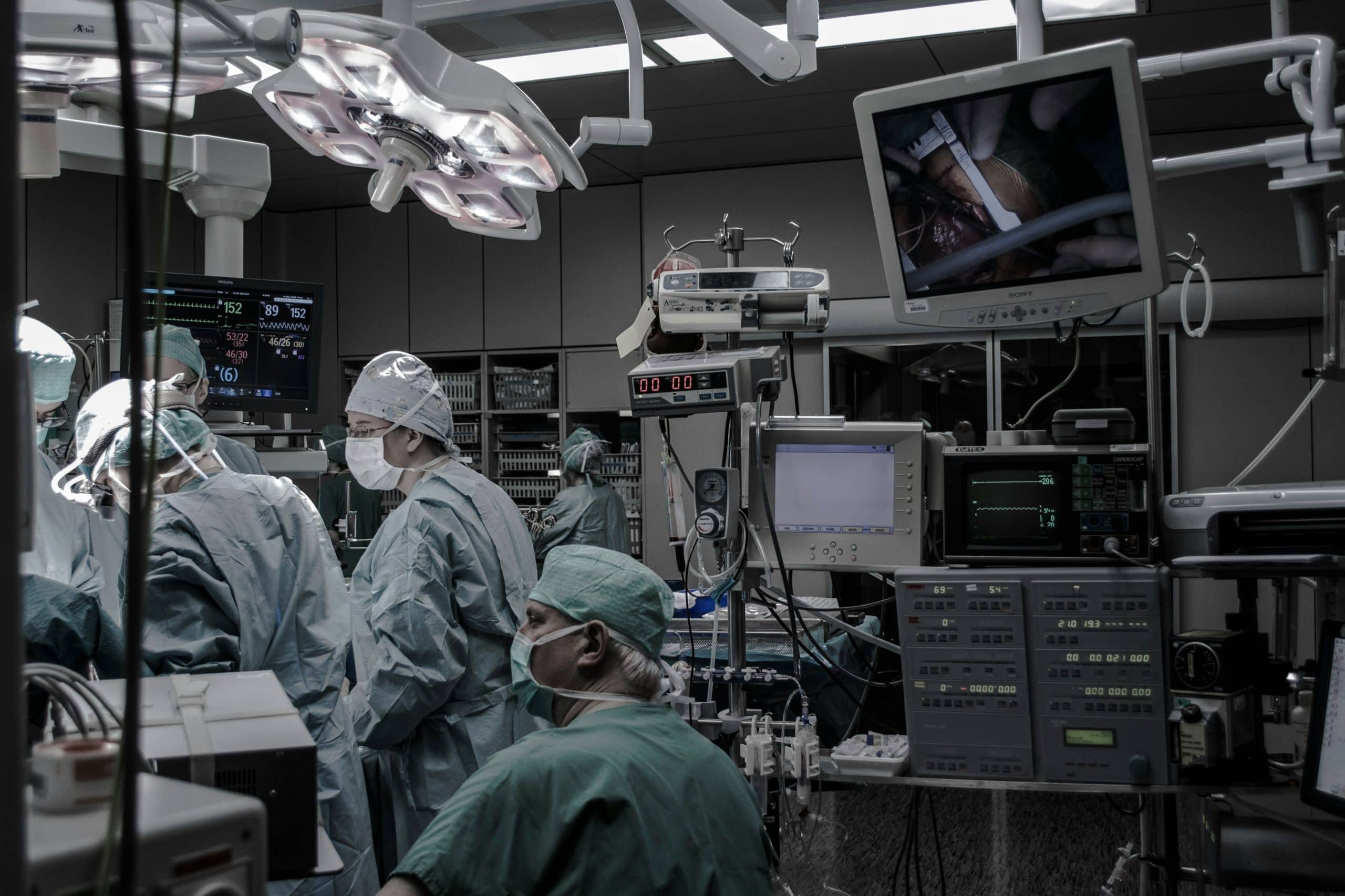The advent of artificial intelligence (AI) and robotics has opened up a myriad of possibilities across all sectors, including healthcare. Specifically, in the realm of surgery, cutting-edge AI algorithms and precise robotics have begun to transform traditional procedures, enhancing surgeons’ capabilities and promising improved patient outcomes.
In this article, we will delve into the various ways in which AI and robotics have revolutionised surgical procedures, from their role in pre-operative planning to their potential in post-operative care.
Also read : How is blockchain technology being used for digital identity?
AI and Robotics in Surgical Planning
Accurate pre-operative planning is crucial in determining the success of any surgical procedure. Traditionally, surgeons have relied on medical imaging data, such as CT scans or MRI, to prepare for surgery. However, interpreting such data requires an immense amount of expertise and is not exempt from human error.
Enter AI and machine learning algorithms. These systems have the capability to analyse vast amounts of medical imaging data with incredible precision, identifying subtle anomalies that might be missed by the human eye. AI can also predict potential complications based on the patient’s health history, giving surgeons valuable insights to guide their approach.
Topic to read : Top 5 Best AI-powered image generators
Furthermore, AI integrates seamlessly with robotics to provide a more precise and personalised surgical plan. For example, robotic systems can create 3D models based on the patient’s anatomy, enabling surgeons to rehearse complex procedures.
During Surgery: The Role of Surgical Robots
Robotic systems have made a significant impact on the actual execution of surgeries. Robotic surgery, often guided by AI algorithms, allows for greater precision and smaller incisions, which can lead to less pain for the patient, quicker recovery times, and reduced risk of infection.
Surgical robots are typically controlled by surgeons from a console. This allows the surgeon to perform complex procedures with more control and precision than traditional methods. The robot can also filter out hand tremors, improving the stability during the procedure.
Moreover, AI can assist during the surgery by providing real-time analytics, such as suggesting the best course of action based on the patient’s vitals or alerting the surgeon if a problem arises.
Post-Operative Care and AI
Beyond the operating room, AI and robotics also play a critical role in post-operative care. For instance, AI algorithms can monitor patient data and detect any deviations from the normal recovery trajectory, allowing for early intervention.
Robotics also has the potential to revolutionise rehabilitation. For example, robotic exoskeletons and prosthetics can assist patients regain their mobility, while AI can monitor the patient’s progress and adapt the rehabilitation program accordingly.
Moreover, AI can aid in managing the patient’s pain post-surgery. By analysing data such as the patient’s medical history, the nature of the surgery, and the patient’s pain levels, AI can suggest personalised pain management strategies.
The Future of Surgery with AI and Robotics
The integration of AI and robotics in the field of surgery is still in its nascent stages. However, the potential for these technologies to further improve patient outcomes and streamline healthcare processes is immense.
AI algorithms are continuously learning and improving. As more surgical data is fed into these systems, their predictive capabilities will only get better. This means more accurate surgical planning, real-time assistance during surgeries, and more efficient post-operative care.
The field of surgical robotics is also advancing rapidly. Researchers are working on developing autonomous robots that can perform simple surgical tasks without human intervention. While this may sound like science fiction, preliminary studies have shown promising results.
In conclusion, while there are still many challenges to overcome, the integration of AI and robotics in the field of surgery holds great promise. As these technologies continue to evolve, we can look forward to a future where surgeries are safer, more efficient, and lead to better patient outcomes.
Artificial Intelligence in Decision Making and Risk Assessment
One of the most vital aspects of surgical procedure is decision making. It involves making choices like the best approach for a particular patient, determining the level of risk associated with a procedure, and developing an optimal post-surgery recovery plan. Traditionally, these decisions have been based on the surgeon’s expertise and experience. However, with the advent of AI and machine learning, this process is being significantly enhanced.
Based on the vast pool of data available from medical databases, including PubMed and Google Scholar, artificial intelligence can generate predictive models to guide decision making. These models can assess the patient’s medical history, current health status, and other relevant factors to recommend the most appropriate surgical procedure. Moreover, AI can evaluate the risk associated with different surgical approaches, helping surgeons make informed decisions that could lead to better surgical outcomes.
AI’s role in decision making is not limited to pre-operative stages. During surgery, AI can provide real-time assistance and guidance to surgeons. By continuously analyzing data from monitors, AI can alert surgeons to changes in the patient’s vital signs, thus aiding in quick response to potential complications.
Machine learning algorithms can also learn from every decision made and its outcome, refining their predictive models over time. This constant learning and adaptation are at the core of AI’s potential in the field of surgery.
Influence of AI and Robotics on Minimally Invasive Surgery
The shift towards minimally invasive procedures is one of the significant trends in modern surgery. These procedures, which involve smaller incisions and less trauma to the body, often result in shorter hospital stays, less post-operative pain, and faster recovery for patients. Robotic systems and AI have been instrumental in advancing this field.
Robotic surgery, also known as robotic-assisted surgery, allows surgeons to perform delicate and complex procedures with enhanced precision. The use of robotic systems in minimally invasive surgeries has proven successful in multiple procedures, with studies showing improved accuracy and precision, reduced blood loss, and lower complication rates.
AI complements the capabilities of surgical robots by providing valuable insights derived from a vast array of data. For example, neural networks, a type of machine learning algorithm, can analyze data from previous surgeries to predict the best robotic movements for specific procedures. This integration of AI and robotics has the potential to further refine and improve minimally invasive surgeries.
Conclusion: The Integration of AI and Robotics in Surgery
The integration of artificial intelligence and robotics in the field of surgery is undoubtedly leading to a new era in healthcare. This amalgamation is enhancing the surgeon’s capabilities, improving decision making, enabling minimally invasive procedures, and ultimately leading to better patient outcomes.
The potential of these technologies in surgery is vast and still largely untapped. As AI algorithms gain access to more data and continue to learn, their predictive and decision-making capabilities will only improve. Similarly, as robotic systems become more sophisticated, they will become even more precise and versatile.
While challenges remain in the form of ethical considerations, data privacy, and the need for rigorous testing and validation, the progress made so far is encouraging. As research in this field continues, powered by platforms like Google Scholar and PubMed, we can anticipate even more groundbreaking developments in the future.
In conclusion, the future of surgery with AI and robotics is promising. As these technologies continue to evolve and integrate, their impact on surgical procedures and patient outcomes is expected to be profound. The path towards this future requires continuous research, innovation, and an unwavering commitment to enhancing patient care.












Comments are closed